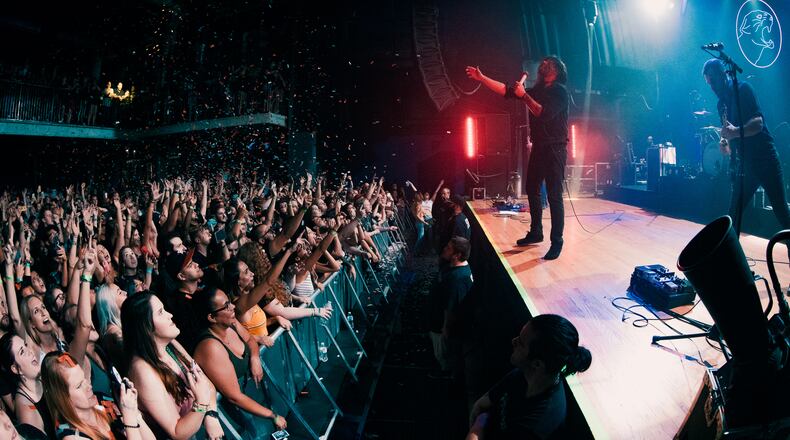Center Stage hosted its final pre-coronavirus show on March 13.
If the venue isn’t able to open the rest of this year, about 300 additional concerts will be lost among the three stages nestled in the Midtown complex.
And then there is the “show staff” (production, security, bartenders) of about 50 and a full-time staff of 10, all impacted by the pandemic closure.
It’s a similar situation at The Masquerade at Underground Atlanta. More than 150 shows between March and June have been scuttled. A team of 30-40 people laid off. Some shows rescheduled for August-September are now looking at early 2021 as a more realistic timeframe.
Music fans have winced at the cancellations of major tours from major artists presented by major concert promoters, but smaller, independent venues have been pummeled by the shutdown of the music industry and face an even harsher climb to daylight.
“The concert industry was the first to shut down and may be one of the last to reopen,” said Greg Green, talent buyer for The Masquerade.
Thousands of venues around the country are experiencing the same – zero dollar revenues since mid-March closures.
But even without the ability to purchase tickets, fans can still support local music havens.
The recently formed National Independent Venue Association is appealing to Congress with a #SaveOurStages campaign to explain the unique situation of their business. As written, the Paycheck Protection Program loans allocated to small businesses will only be forgiven if employees are kept on the payroll for eight weeks and the money is used for payroll, utilities and rent.
But as Josh Antenucci, senior partner at promoter Rival Entertainment and event producer and production manager for Center Stage, explained, "There is no way we can operate in any way until you can gather people again, and nobody knows when that will be…we have to scream from the rooftops if we're going to be heard that we are still here and let people know that we are literally among the greatest business victims of this pandemic. We are small businesses and self-funded. We are lobbying Congress to know who we are and understand how our business operates."
Since NIVA's launch, more than 300,000 emails have been sent from fans to their state representatives. (Visit nivassoc.org to participate and/or purchase #SaveOurStages merchandise.)
Joining Center Stage and The Masquerade on the list of NIVA members are Smith’s Olde Bar, City Winery, Eddie’s Attic, Red Clay Music Foundry and several other venues throughout the state, while more than 1,400 venues nationwide have signed on.
Not only are these venues imperative to local culture, but they’re economic generators as well; according to the Arts and Cultural Production Satellite Account, arts and culture contributed $877.8 billion – or 4.5 percent – to the nation’s gross domestic product in 2017.
Green believes that it’s necessary “to out ourselves as an industry in front of lawmakers and say, ‘Hey, we’re important, too. Think about us’… we’re looking at months and months of expenses that don’t go away. There’s still rent and insurance and all of the stuff associated with running a venue.”
There is also still great responsibility, and, as Antenucci reminded, venues are obligated to support the well-being of their customers.
“Just because a government agency says we can open does not mean we can just go ahead and do so,” he said. “The people are the heartbeat of what we do, and you don’t want to lose any of them. And it’s gonna be a long time until we can feel comfortable again.”
At Smith’s Olde Bar, another Atlanta institution that provided early performance platforms for artists ranging from Janelle Monae to Kings of Leon, it’s a slightly different scenario since the building includes a full-service restaurant and bar, which might provide some income when it’s able to open.
But as far as the two music spaces – the “Atlanta Room” and the “Music Room” – there are numerous considerations, even when the yellow flag is lifted on live music events.
“They can’t ask us to run at 20 percent capacity. That won’t work financially,” said Sean McPherson, talent buyer for Smith’s. “We have a great landlord (Selig Enterprises) who has been very helpful and the owners (Dan Nolen and Charlie Hendon) want to get open as soon as possible, but we want to do it safely. We’re the smallest concert promoter in town, so we’re waiting to see what the bigger guys are doing and will take it from there. But it boils down to one thing: we don’t know what’s going to happen.”
That is true. But at least in the near-term, fans have the chance to raise their voices in support.
About the Author
Keep Reading
The Latest
Featured






